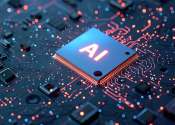Are emergent abilities in large language models just in-context learning?
According to a new study led by TU Darmstadt, AI models such as ChatGPT are apparently less capable of learning independently than previously assumed.
Aug 12, 2024
0
47
Computer Sciences

According to a new study led by TU Darmstadt, AI models such as ChatGPT are apparently less capable of learning independently than previously assumed.
Aug 12, 2024
0
47
Machine learning & AI

Ask a large language model (LLM) like GPT-4 to smell a rain-soaked campsite, and it'll politely decline. Ask the same system to describe that scent to you, and it'll wax poetic about "an air thick with anticipation" and "a ...
Aug 14, 2024
0
7
Business

California is partnering with tech giant Nvidia to help train the state's students, college faculty, developers and data scientists in artificial intelligence, officials announced Friday.
Aug 9, 2024
0
13
Energy & Green Tech

Power grid operators, such as National Grid in the UK, rely on high-performance computers to plan grid expansions and to schedule when energy should be produced from different sources. These problems are becoming larger and ...
Aug 9, 2024
0
8
Robotics

New research from the University of Massachusetts Amherst shows that programming robots to create their own teams and voluntarily wait for their teammates results in faster task completion, with the potential to improve manufacturing, ...
Aug 13, 2024
0
39
Consumer & Gadgets

Do you find yourself doom-scrolling, or spending more time than you should consuming negative news on the internet and social media and want to stop? Well, there's now an app for that.
Aug 12, 2024
0
44
Machine learning & AI

As organizations rush to implement artificial intelligence (AI), a new analysis of AI-related risks finds significant gaps in our understanding, highlighting an urgent need for a more comprehensive approach.
15 hours ago
0
15
Business

U.S. firms that use cloud-computing services are more likely to export their products and services, according to a new study by researchers at Penn State and the U.S. National Science Foundation (NSF). The team said the findings ...
Aug 13, 2024
0
3
Machine learning & AI

In Diplomacy, a strategy game set on the eve of World War I, success hinges not on luck but the ability to negotiate. Players, each representing the armed forces of a European superpower, spend much of their time building ...
10 hours ago
0
6
Robotics

A new algorithm may make robots safer by making them more aware of human inattentiveness. In computerized simulations of packaging and assembly lines where humans and robots work together, the algorithm developed to account ...
13 hours ago
0
35
A computer is a machine that manipulates data according to a set of instructions.
Although mechanical examples of computers have existed through much of recorded human history, the first electronic computers were developed in the mid-20th century (1940–1945). These were the size of a large room, consuming as much power as several hundred modern personal computers (PCs). Modern computers based on integrated circuits are millions to billions of times more capable than the early machines, and occupy a fraction of the space. Simple computers are small enough to fit into a wristwatch, and can be powered by a watch battery. Personal computers in their various forms are icons of the Information Age and are what most people think of as "computers". The embedded computers found in many devices from MP3 players to fighter aircraft and from toys to industrial robots are however the most numerous.
The ability to store and execute lists of instructions called programs makes computers extremely versatile, distinguishing them from calculators. The Church–Turing thesis is a mathematical statement of this versatility: any computer with a certain minimum capability is, in principle, capable of performing the same tasks that any other computer can perform. Therefore computers ranging from a mobile phone to a supercomputer are all able to perform the same computational tasks, given enough time and storage capacity.
This text uses material from Wikipedia, licensed under CC BY-SA